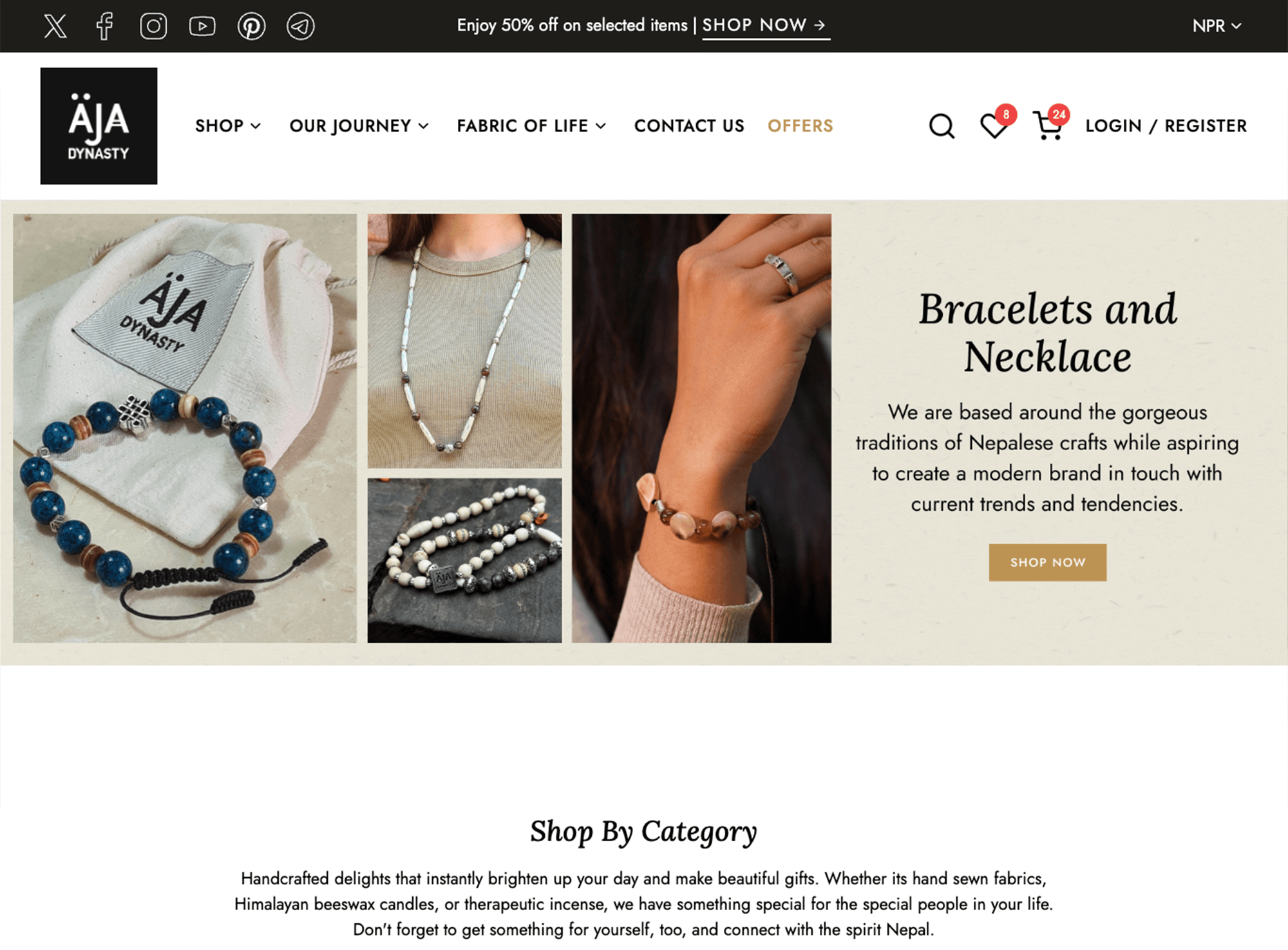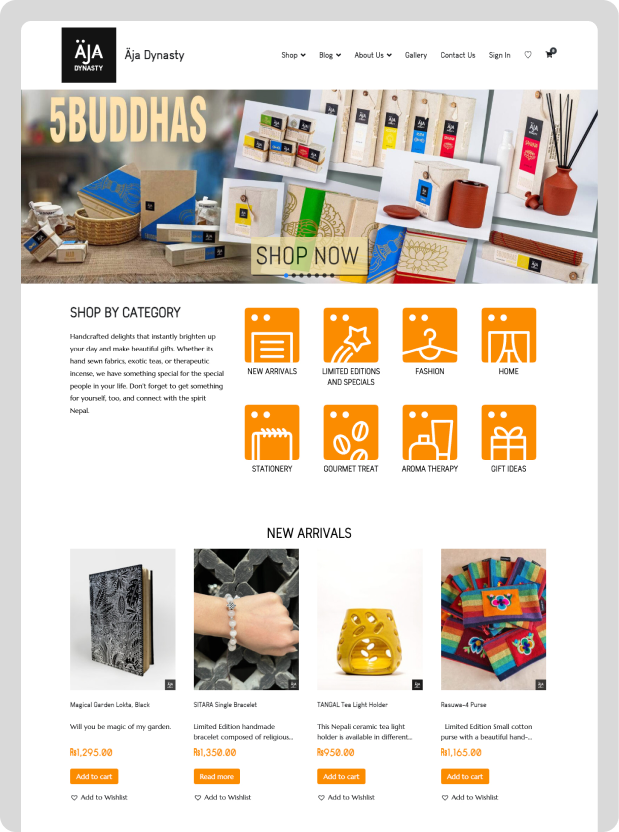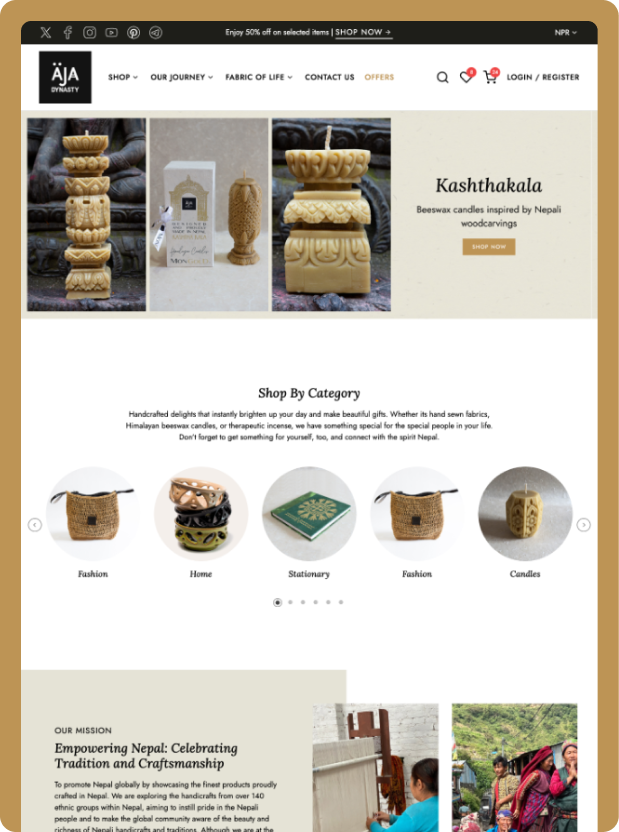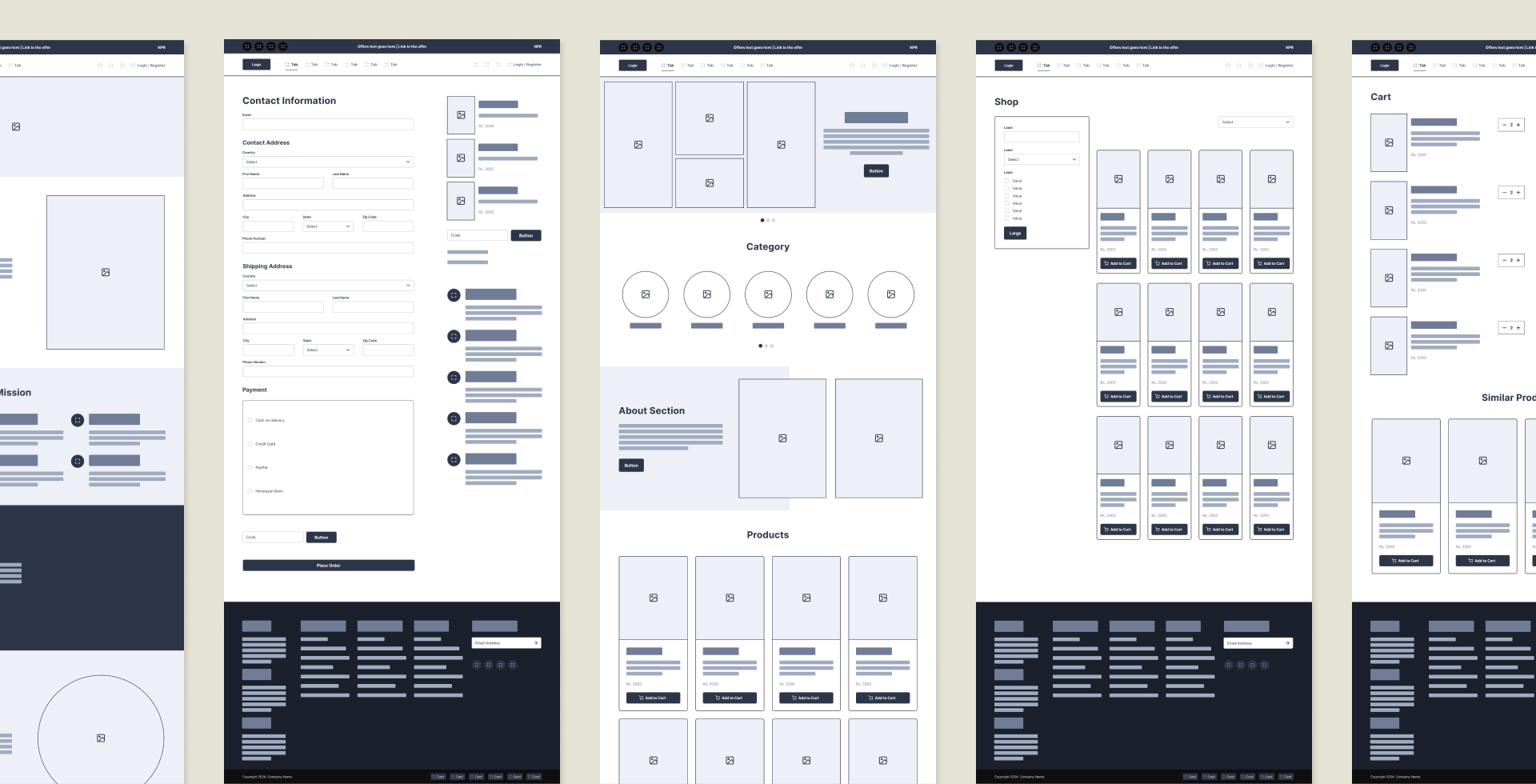B2C, E-Commerce 
Redefining B2C Shopping for Aja Dynasty: A User-Centric Approach to Seamless E-commerce Design

B2C, E-Commerce 

About the Project
Aja Dynasty is a fusion of Nepalese culture and contemporary design, celebrating the present moment. The name “Aja” derives from Sanskrit, meaning “today,” symbolizing a focus on living in the present. Aja Dynasty blends Nepalese traditions with modern flair, offering high-quality, authentic Nepalese products. The website redesign aimed to globally showcase Nepal’s richness, present top-notch products, and become a symbol of Nepalese artistry and craftsmanship.
View Live WebsiteIndustry
B2C, E-Commerce
Agency
Source Taggers
Year
2024
Roles
Research & Discovery
Wireframing
Prototyping
UI/UX Design
Web Design
Wordpress
HTML & CSS Developer
Tools
Figma
Zeplin
Trello
Adobe CC
Illustrator
Photoshop


01. Start
02. Research
The research and discovery phase for Aja Dynasty's website redesign involved understanding the brand, market, and user needs. We started with consultations to understand the client's vision, followed by analyzing top competitors to find opportunities for differentiation. Identifying the target audience—cultural enthusiasts, luxury shoppers, and design aficionados—was key. Surveys, interviews, and user testing provided insights into user preferences and pain points, revealing issues like confusing navigation and lack of mobile optimization. We found a strong user interest in the cultural stories behind the products. These findings helped define clear goals for a user-centric redesign that blends Nepalese tradition with modern design to engage users effectively.
Understanding the client and market is crucial for designing the Aja Dynasty website. By exploring the brand's goals and values, I gained insights into its mission of merging Nepalese tradition with modern design. I also identified cultural enthusiasts, luxury shoppers, and design lovers as the target audience. This understanding helped me create a website that resonates with these groups, providing a tailored and engaging experience.
To position Aja Dynasty effectively, we analyzed top competitors in the cultural and designer brand space. This analysis included studying their website designs, user experience, product presentation, and marketing strategies. The goal was to identify industry standards, understand what competitors were doing well, and pinpoint areas where Aja Dynasty could differentiate itself. Key aspects like visual design, navigation, content strategy, and mobile responsiveness were closely examined.
The target audience for Aja Dynasty includes cultural enthusiasts, luxury shoppers, and design aficionados. Cultural enthusiasts are individuals passionate about exploring and preserving cultural heritage. Luxury shoppers seek high-quality, unique products that stand out. Design aficionados are interested in modern design and aesthetic appeal combined with traditional elements.
User insights were gathered through a combination of surveys, interviews, and user testing. Surveys helped in understanding user demographics, preferences, and behaviors. Interviews provided deeper insights into user motivations and pain points. User testing allowed us to observe real-time interactions with the current website, identifying usability issues and areas for improvement. These methods collectively provided a comprehensive understanding of user expectations and challenges.
Users showed a strong interest in the cultural stories behind Aja Dynasty's products, indicating a desire for authenticity and connection with Nepalese heritage.
The existing website had navigation problems, with users finding it confusing and difficult to navigate. This highlighted the need for improved site structure and intuitive navigation.
The current website lacked mobile optimization, leading to a poor user experience for mobile users. This underscored the importance of ensuring a seamless experience across all devices.
Users expressed a desire for engaging content that goes beyond product listings, indicating an opportunity to incorporate storytelling and immersive experiences into the website design.

Cultural Travel Blogger
GOALS: Emma loves sharing cultural discoveries from her travels. She's on the lookout for unique products with rich stories to enhance her blog.
FRUSTRATIONS: Emma finds it hard to find genuine, culturally meaningful items during her trips. She's tired of sifting through generic souvenirs.
NEEDS: Emma needs a platform with a curated selection of authentic cultural products, making her blogging journey smoother.

Business Professional
GOALS: John seeks unique, culturally inspired products to elevate his professional image and enhance client experiences.
FRUSTRATIONS: John is tired of generic corporate gifts and wants authentic, culturally significant items to impress clients.
NEEDS: John needs a platform offering curated, culturally rich products that align with his brand and make a lasting impression on clients.
03. Design Process
I designed straightforward wireframes for the Aja Dynasty site, focusing on user needs and business goals. These blueprints provide a clear roadmap for the website's design, ensuring a seamless user experience aligned with the brand's vision.

The Global Design System for the Aja Dynasty website revolves around a refined palette of golden and black, echoing the brand's elegance. Typography is carefully chosen to enhance readability and convey sophistication, while drawing inspiration from traditional Nepalese art. This harmonious blend of typography, color palette, and components ensures a cohesive and memorable user experience, reflecting Aja Dynasty's cultural roots and brand identity.


In crafting the visual design for the Aja Dynasty website, I aimed to blend traditional Nepalese style with modern design. I chose rich colors like deep golds and blacks to evoke a sense of luxury and heritage. For clarity and sophistication, I used modern, easy-to-read typography. High-quality images and simple layouts showcase the authenticity of Aja Dynasty's products, while intuitive navigation guides users smoothly through the site. This mix of visual elements reflects the brand's identity and invites users to explore its cultural stories.
04. Conclusion
My journey through this project provided some valuable insights.
Understanding user needs and preferences is crucial for creating an engaging and effective website.
Successfully blending traditional elements with modern design can create a unique and appealing brand identity.
Engaging content that tells a story can significantly enhance user engagement and brand loyalty.
Ensuring a seamless mobile experience is essential in today’s digital landscape.